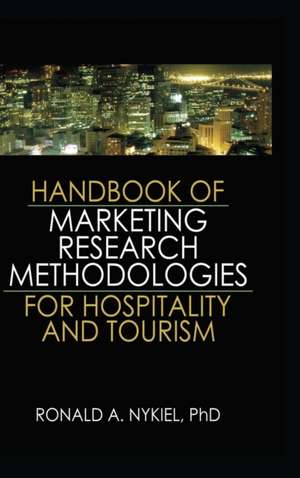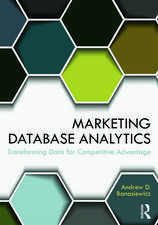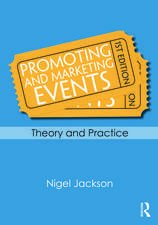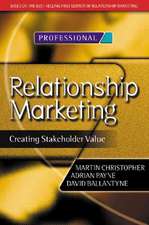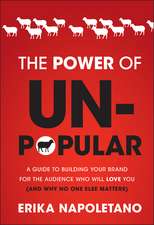Handbook of Marketing Research Methodologies for Hospitality and Tourism
Autor Roland Nykielen Limba Engleză Hardback – 19 mai 2015
The success of marketing programs is dependent on the knowledge of the trends in the marketplace. Handbook of Marketing Research Methodologies for Hospitality and Tourism is a comprehensive guide that clearly explains analyzing markets, utilizing qualitative and quantitative research methodologies, applying findings to market, development, and marketing strategies for the hospitality industry. The text contains detailed outlines and case studies of several types of research, including feasibility studies, market assessment studies, and site selection studies. Numerous graphic examples and presentation techniques are provided to bridge between theory and applied research with ease.
Handbook of Marketing Research Methodologies for Hospitality and Tourism clearly details, all in a single volume, the application of research methodology to the real world, as well as showing how to effectively communicate findings and recommendations. This resource provides dozens of case examples and close attention to clearly explaining all facets of market analysis. Part one discusses research and methodologies, including primary and secondary data and integrative research. Part two explores market analysis and assessment, including marketing assessment for development planning and assessing focal points and intuitive techniques. The third part helps the reader apply their learned research into strategies. The final section explains market analysis planning and communications, including preparing a research-based business review and the effective presentation of research findings. The text provides appendixes of essential data, and a helpful glossary of terms.
Topics in Handbook of Marketing Research Methodologies for Hospitality and Tourism include:
- qualitative market analysis techniques and applications
- quantitative market research and analysis techniques and applications
- approaches to organized site selection studies, market studies, and project feasibility studies
- identification of the processes and sources for key market data for projects, markets, and sites
- presentation and communication techniques and strategies for market analysis and research findings
- the relationship of market analysis and research to marketing and development strategy selection
- and more!
| Toate formatele și edițiile | Preț | Express |
|---|---|---|
| Paperback (1) | 408.93 lei 6-8 săpt. | |
| Taylor & Francis – 13 aug 2007 | 408.93 lei 6-8 săpt. | |
| Hardback (1) | 1116.27 lei 6-8 săpt. | |
| Taylor & Francis – 19 mai 2015 | 1116.27 lei 6-8 săpt. |
Preț: 1116.27 lei
Preț vechi: 1361.30 lei
-18% Nou
Puncte Express: 1674
Preț estimativ în valută:
213.59€ • 223.61$ • 176.74£
213.59€ • 223.61$ • 176.74£
Carte tipărită la comandă
Livrare economică 05-19 aprilie
Preluare comenzi: 021 569.72.76
Specificații
ISBN-13: 9781138834873
ISBN-10: 1138834874
Pagini: 376
Dimensiuni: 152 x 229 x 25 mm
Greutate: 0.66 kg
Ediția:1
Editura: Taylor & Francis
Colecția Routledge
Locul publicării:Oxford, United Kingdom
ISBN-10: 1138834874
Pagini: 376
Dimensiuni: 152 x 229 x 25 mm
Greutate: 0.66 kg
Ediția:1
Editura: Taylor & Francis
Colecția Routledge
Locul publicării:Oxford, United Kingdom
Cuprins
- Acknowledgments
- Introduction
- PART I: RESEARCH AND METHODOLOGIES
- Chapter 1. Defining Marketing Research, Market Analysis, and Applications
- Chapter Objectives
- Purpose
- Process
- Techniques
- Segmentation, Targeting, and Positioning (STP)
- Chapter Review
- Key Concepts/Terms
- Discussion Question
- Case. 1.1. Hyatt Corporation—A Variation of the Singleness Strategy Through Product Type/Identification and Market Segment Positioning
- Case 1.2. Toyota Motor Corporation—Positioning to Perfection
- Chapter 2. Primary and Secondary Research Data
- Chapter Objectives
- Primary Research Data
- Sampling
- Secondary Research Data
- Sources of Data
- Chapter Review
- Key Concepts/Terms
- Discussion Questions
- Case 2.1. Looking Within—Observation
- Case 2.2. The Power of the Survey and Award
- Chapter 3. Qualitative Research
- Chapter Objectives
- Definition and Role
- Advantages, Disadvantages, and Perspectives
- Types and Techniques
- Qualitative Data Analysis
- Chapter Review
- Key Concepts/Terms
- Discussion Questions
- Case 3.1. Carlson Companies, Inc.
- Case 3.2. American Express Card Member Services
- Chapter 4. Quantitative Research
- Chapter Objectives
- Definition
- Advantages and Disadvantages
- Types of Quantitative Research
- Research Design Elements
- Questionnaires: Design, Statistical Analysis, and Scales
- Sampling
- Applications in the Services Sector
- Components of a Quantitative Research Plan
- Chapter Review
- Key Concepts/Terms
- Discussion Questions
- Case 4.1. Starwood Hotels and Resorts Worldwide, Inc.
- Chapter 5. Integrative Research
- Chapter Objectives
- Definition
- Advantages and Disadvantages
- Triangulation
- Case Studies
- Action Research
- Academic versus Applied Action Research
- Issues
- Chapter Review
- Key Concepts/Terms
- Discussion Questions
- Case 5.1. Stouffer Hotels and Resorts: Competitive Strategy
- PART II: MARKET ANALYSIS AND ASSESSMENT
- Chapter 6. Analyzing Research Findings and Data
- Chapter Objectives
- Analysis of Qualitative Research Findings
- Analysis of Quantitative Data
- Perspectives
- Chapter Review
- Key Concepts/Terms
- Discussion Questions
- Case 6.1. Chick-fil-A—Assessment, Prioritization, and Action
- Chapter 7. Location Analysis and Site Evaluation
- Chapter Objectives
- Timing
- Land Acquisition Considerations
- Land Selection Guidelines
- Chapter Review
- Key Concepts/Terms
- Discussion Questions
- Case 7.1. Foxwoods Resort Casino—A Megaforce
- Chapter 8. The Design and Components of a Feasibility Study
- Chapter Objectives
- Definitions
- Market Feasibility Studies Overview
- Conducting Feasibility studies
- Sample Design and Components of a Feasibility Study
- Chapter Review
- Key Concepts/Terms
- Discussion Questions
- Case 8.1. Best Sites, Great Location, a Very Positive Feasibility Study—Oops: We Didn’t Know!
- Chapter 9. Market Assessment for Development Planning
- Chapter Objectives
- Introduction to the Development Planning Process
- Development Plan Organization
- Sample Development Plan Outline
- Development Planning in Perspective
- Chapter Review
- Key Concepts/Terms
- Discussion Questions
- Case 9.1. Sonic Drive-In—External Forces revive the Concept
- Case 9.2. Carnival Corporation—Positioning and Strategy Selection
- Chapter 10. Assessing Focal Points and Intuitive Techniques
- Chapter Objectives
- Types of Marketing Research
- Marketing Research Techniques
- Five Essential Marketing Intelligence Tools
- Marketing Research Presentation Tools
- Chapter Review
- Key Concepts/Terms
- Discussion Questions
- Case 10.1. Mailing Less and Making More
- Case 1
Descriere
The success of marketing programs is dependent on the knowledge of the trends in the marketplace. Handbook of Marketing Research Methodologies for Hospitality and Tourism is a comprehensive guide that clearly explains analyzing markets, utilizing qualitative and quantitative research methodologies, applying findings to market, development, and marketing strategies for the hospitality industry. The text contains detailed outlines and case studies of several types of research, including feasibility studies, market assessment studies, and site selection studies. Numerous graphic examples and presentation techniques are provided to bridge between theory and applied research with ease.
